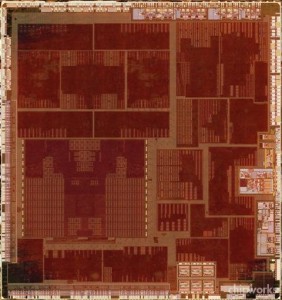I told you last night that in the new Apple TV there is an A5 single core chip built using a 32 nm manufacturing process, but a similar chip would be found in the new iPad 2 16 Wi-Fi tablet available for $399 in the US. Of course, we have a dual-core processor in the tablet, but the 32 nm manufacturing process seems to have been used to build it and this could be extremely beneficial for users. There is a possibility that this new chip made by Apple will help improve the battery autonomy according to those from AnandTech and the reasoning behind the statement is based on the fact that the processor would be smaller and consume less energy than the one in the old versions of the iPad 2.
The end result is that if you're an iPad2,4 owner, you've got Samsung 32nm HKMG silicon inside. There's no doubt about iPad2,4 being out and in the wild either, as a number of geekbench 2 runs have popped up since release on their online result browser, which I've been watching like a hawk. The interesting other question is whether iPad2,4 owners have improved battery life compared to those with iPad2,1 (WiFi), although admittedly that's not going to be a common upgrade path for existing iPad 2 owners to check out. I no longer own an iPad 2 but am going to set out to measure and compare to see just how much of a difference there is, which in turn might say something interesting about Samsung's 32nm HKMG process.
If the new chip in the improved version of the iPad 2 will offer better autonomy, then some users may be disappointed that they bought the device before the launch of the new one, but I imagine that Apple did it in such a way that there are no differences in terms of autonomy . However, if you want to purchase the new version of the tablet, you must know that it comes with iOS 5.1 installed directly, so if you find new iPad 2 16 GB Wi-Fi tablets that have iOS 5.0.1, then you will know that they have not incorporated the new chip.
















